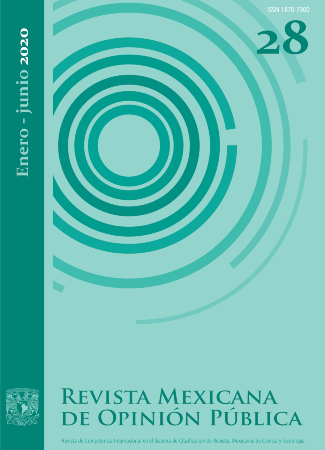Options for Democracy in Nuevo Leon Citizens
Main Article Content
Abstract
The imaginaries of democracy admit variations in types and models. This paper presents the analysis of the responses to a questionnaire provided by a sample of 1 097 Nuevo Leon citizens on different aspects of electoral behavior, which include, among other things, interpretations and evaluations of some models of democracy. The data were collected in a random survey by household sampling carried out in the first three weeks of the month of June 2018 and sponsored by the State Electoral Commission of Nuevo Leon (Comisión Estatal Electoral de Nuevo León). The models are those that correspond to electoral or representative democracy, participatory democracy, assembly democracy and delegative democracy. Regrettably, the conclusions are not very novel and ratify the deficiencies in the construction of relevant concepts among the voters, in this case of the population of Nuevo León, Mexico.
Article Details
Citas en Dimensions Service
References
ADORNO, Theodor et al., The Authoritarian Personality, Harper and Brothers, Nueva York, EE. UU., 1950.
BOURDIEU, Pierre, Sociología y cultura, Grijalbo, D. F., México, 1990.
Corporación Latinobarómetro, Latinobarómetro, Corporación Latinobarómetro, Santiago de Chile, Chile, 2018. Disponible en <http://www.latinobarometro.org/latNewsShow.jsp>, [fecha de consulta: 23 de enero, 2019].
DAHL, Robert, La democracia, una guía para los ciudadanos, Taurus, Madrid, España, 1991.
DAHL, Robert, Los dilemas del pluralismo democrático, Alianza, D. F., México, 1999.
DIAMOND, Larry y PLATTNER Marc (eds.), Democracy in decline?, John Hopkins University Press, Baltimore, EE. UU.2015.
HABERMAS, Jürgen, La inclusión del otro, Paidós, Barcelona, España, 1999.
HELD, David, Modelos de democracia, 3ª. ed., Alianza, Madrid, España, 2007.
KEANE, John, Vida y muerte de la democracia, Fondo de Cultura Económica, Ciudad de México, México, 2018.
LEVITSKY, Steven, y ZIBLATT, Daniel, Cómo mueren las democracias, Ariel/ Planeta, Ciudad de México, México, Ariel/ (Planeta), 2018.
NUN, José, Democracia: ¿gobierno del pueblo o gobierno de los políticos?, Buenos Aires, Fondo de Cultura Económica, Argentina, 2000.
O’DONNELL, Guillermo, Contrapuntos. Ensayos escogidos sobre autoritarismo y democratización, Paidós, Barcelona, España, 1997.
RANCIÈRE, Jacques, El odio a la democracia, Amorrortu, Buenos Aires, Argentina, 2006.
SCHMITTER, Philippe, “Crisis and Transition, but not Decline”, en DIAMOND, Larry y PLATTNER, Marc (eds.), Democracy in Decline?, John Hopkins University Press, Baltimore, EE. UU., 2015, pp. 39-57.
URBINATI, Nadia, Democracy Disfigured. Opinion, Truth, and the People, Harvard University Press, Cambridge, Inglaterra, 2014.
URBINATI, Nadia, “Unpolitical Democracy”, Political Theory, vol. 38, núm. 1, Virginia, EE. UU., 2010, pp. 65-92. Disponible en <https://journals.sagepub.com/doi/abs/10.1177/0090591709348188#>, 2010, DOI: 10.1177/0090591709348188, [fecha de consulta: 10 de enero, 2019].

Revista Mexicana de Opinión Pública por Universidad Nacional Autónoma de México se distribuye bajo una Licencia Creative Commons Atribución-NoComercial-SinDerivar 4.0 Internacional.
Basada en una obra en http://revistas.unam.mx/index.php/rmop.




